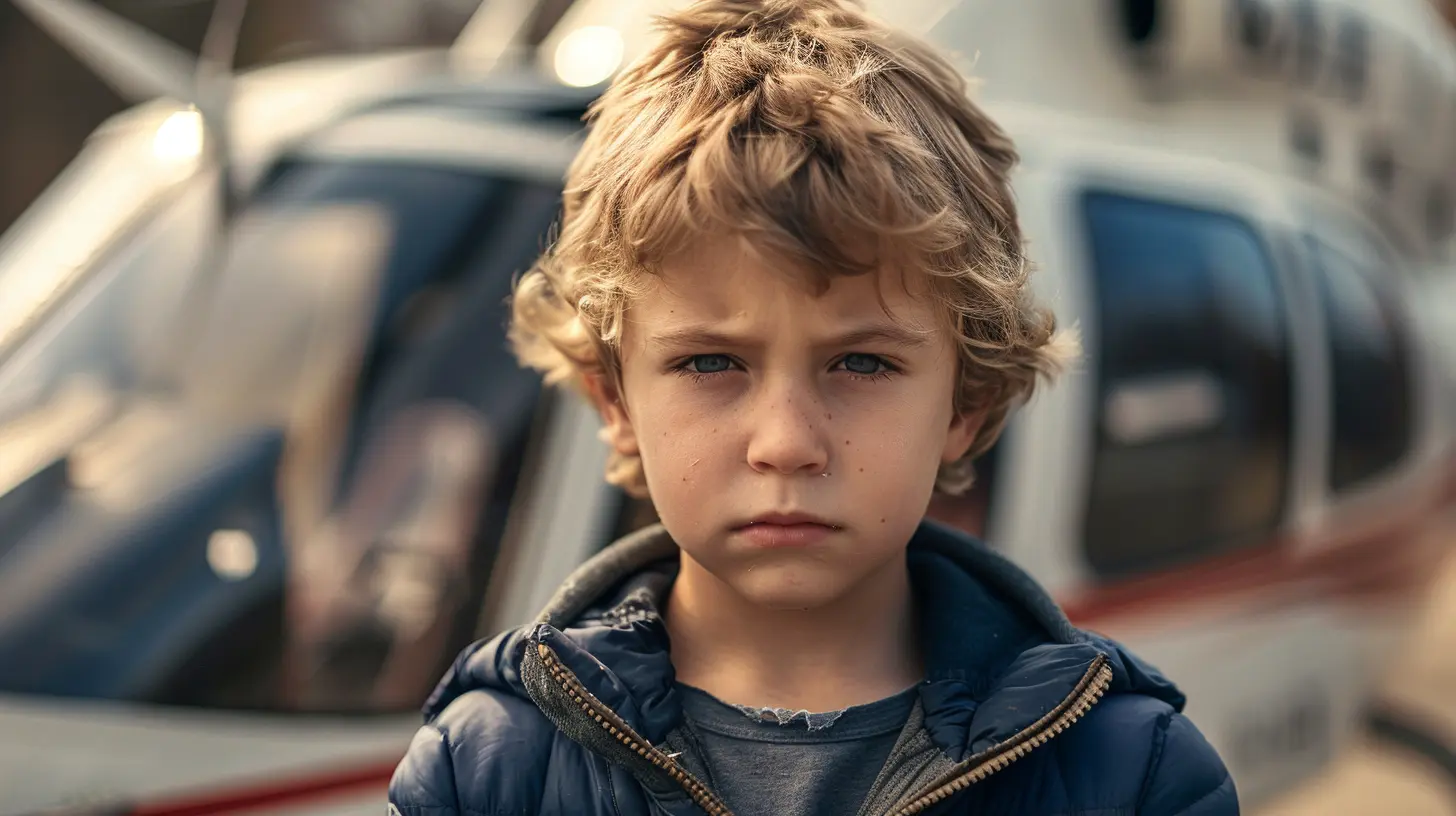Helicopter Parenting: When Should You Step Back?
3 September 2025
Picture this: you're standing on the sidelines of your child's soccer game, heart racing, practically coaching from the bleachers. You're biting your tongue during their homework meltdowns, resisting the urge to "just fix it." Sound familiar? You, my friend, might be flying a well-maintained, over-fueled helicopter—a metaphorical one, of course.
Welcome to the world of helicopter parenting, where the line between caring and controlling gets paper-thin. It’s a wild ride. You want what's best for your kid, naturally. But at what point does involvement become interference? When does hovering clip their wings instead of helping them fly?
Let’s dive deep (and I mean deep) into the mysterious realm of helicopter parenting and figure out when it’s time to take that emotional step back.
What Exactly Is Helicopter Parenting?
Let’s call it how it is: helicopter parenting is when parents become overly focused on their child’s experiences and problems. They’re always ready to swoop in—resolving conflicts, fixing failures, and shielding from life's little bruises.This type of parenting isn’t born out of malice. Nope. It’s actually driven by love, anxiety—and sometimes a teensy bit of control-freak tendencies. You’re not trying to micromanage their life; you're just trying to protect it, right?
But here's the kicker: too much protection can backfire.
Signs You Might Be a Helicopter Parent
Wondering if you’re hovering a bit too high? Here's a quick reality check:- Do you finish your child’s homework “just to save time”?
- Have you ever called their teacher to argue about a grade?
- Do you manage their schedule down to the minute?
- Have you intervened in a playground dispute?
- Did you apply to colleges for them?
If you’re nodding along, there's a high chance your propellers are spinning full speed.
Why Do Parents Hover?
Let’s not be too hard on ourselves. There are real reasons parents fall into the helicopter trap:1. Fear of Failure (Theirs and Yours)
In an ultra-competitive world, it’s easy to feel like one setback spells doom. So, we pull strings, clear obstacles, and shield them from discomfort like knights in shining armor. But in doing so, are we stealing their ability to deal with challenges?2. Pressure to Be the “Perfect Parent”
Social media doesn’t help either. From Pinterest-perfect lunchboxes to kids winning awards at 5 years old, comparison becomes a beast. You're not just parenting—you're performing.3. Anxiety and Control
Parenting isn’t easy. It’s messy, unpredictable, and emotionally charged. Trying to control everything gives the illusion of safety—but it’s just that: an illusion.
The Hidden Costs of Helicopter Parenting
Let’s get real: while it feels like you’re doing the right thing, overparenting can silently chip away at your child’s development.1. Lack of Problem-Solving Skills
Kids need to struggle a little. It’s how they learn grit. If you’re always fixing things, they don’t get a chance to figure stuff out for themselves.Think of it this way—if you always tie their shoes, how will they ever learn to make a knot?
2. Low Self-Esteem
When parents constantly step in, kids start to doubt themselves. “Why is mom always correcting me? Am I not good enough?”That inner voice follows them well into adulthood.
3. Anxiety and Burnout
Children of helicopter parents often report higher stress levels. Why? Because when failure isn’t an option, life becomes a never-ending test.So… When Should You Step Back?
Ah, the million-dollar question! The truth is, there’s no one-size-fits-all answer. But here are some golden clues that it’s time to ease off the throttle:1. When They Can Speak for Themselves
If your six-year-old can tell the barista what they want, let them. If your teenager can email their teacher about a missed assignment, let them do it. Silence your inner micromanager.2. When Consequences Are Safe
Was there a forgotten lunchbox? Let them problem-solve. Missed the bus? Maybe they’ll set their alarm next time.As long as the consequences aren't dangerous, let them feel the sting. It builds resilience like nothing else.
3. When They Express the Need for Space
Sometimes kids tell us—directly or indirectly—“back off.” They might say it with words or with eye-rolls and slammed doors. Either way, it’s a sign they need independence.Respect it. Trust them a little. You might be surprised.
How to Step Back Without Stepping Away
Letting go doesn’t mean abandoning them. It's about shifting from the pilot’s seat to the co-pilot role.1. Teach Instead of Fixing
Next time your child struggles, resist the urge to jump in. Ask guiding questions instead:- “What do you think you should do?”
- “What’s another way to handle this?”
- “How can I support you without taking over?”
You’re not out of the picture—you’re just letting them sketch the lines.
2. Set Boundaries with Freedom
Picture it like a playground: there’s a fence, but loads of room to roam. Give clear limits, but allow freedom within them.A curfew, for example, gives structure. But letting them pick their friends shows trust.
3. Celebrate Effort, Not Just Success
Don’t just praise the A+. Celebrate the studying, the showing up, the trying. That’s what builds true confidence.Because let’s face it—life's not just about winning. It’s about bouncing back after you fall flat on your face.
Real Talk: What If They Fail?
Here’s the raw truth: they will. At some point, your child will mess up, fall short, or get their heart broken. And you? You'll want to rush in with Band-Aids and bubble wrap.But sometimes, the best healing comes from sitting beside them—quietly, supportively—not fixing, not judging.
Let them fail with you, not because of you. Big difference.
Helicopter Parenting in the Digital Age
Parenting today is a whole different game. With tracking apps, online grades, and social media surveillance, it's so easy to oversee every part of your kid’s life.But just because you can, doesn't mean you should.
Sometimes the smartest move is to turn off the GPS and let them find their own path—even if it means a few wrong turns.
Redefining Success as a Parent
Let’s flip the script: what if success as a parent isn’t about having a perfect kid—but a capable one?Not the child who wins every trophy, but the one who knows how to recover after losing.
Not the kid who never cries, but the one who can sit with their emotions—and grow from them.
Final Thoughts: You’re Still a Good Parent (Even If You Let Go)
Letting go doesn’t mean you love them less. It means you love them enough to trust them.So next time you feel the urge to hover, pause. Take a breath. Ask yourself:
> "Am I doing this for them… or for me?"
Because maybe—just maybe—it’s time to land the helicopter and let your child start navigating on their own.
And don’t worry. You’ll still be there—watching, cheering, and always ready if they truly need you.
Just… from a little more distance.
all images in this post were generated using AI tools
Category:
Parenting StylesAuthor:

Austin Wilcox
Discussion
rate this article
1 comments
Erin Maddox
In parenting, finding the balance between guidance and independence is crucial. Stepping back allows children to develop resilience and problem-solving skills. Trust in their ability to navigate challenges fosters confidence, nurturing their growth into capable, self-reliant individuals.
October 3, 2025 at 2:28 AM

Austin Wilcox
Absolutely! Striking that balance is essential for fostering children's independence and resilience while still providing support when needed.


